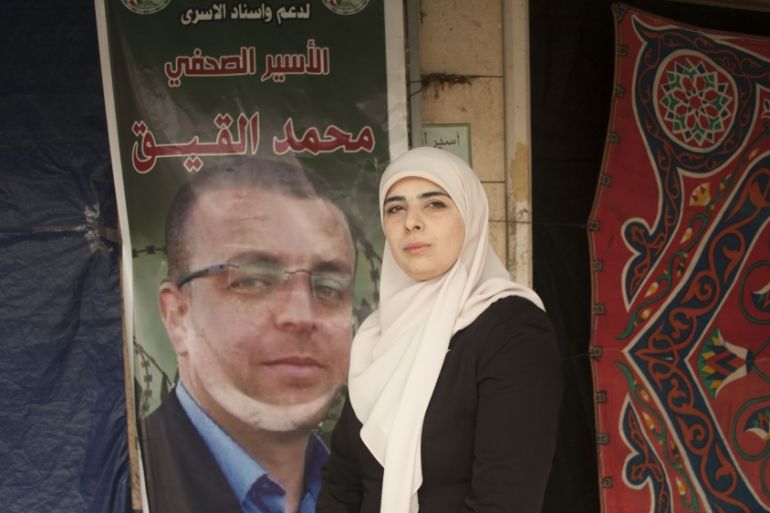Palestinian hunger strikes: ‘My husband is dying’
With a deal still elusive in Mohammed al-Qeeq’s case, observers fear Israel is clamping down on hunger strikers.

Closer to death than life, Palestinian journalist Mohammed al-Qeeq has been refusing food for nearly three months to protest against his ill treatment by Israeli authorities while in administrative detention.
Many Palestinian prisoners have adopted the tactic of hunger strikes; last summer, Khader Adnan was released from jail after refusing food for 56 days. But many observers fear that the Israelis are trying to put an end to this strategy, which is typically used as a last resort by Palestinian prisoners.
Keep reading
list of 4 itemsThe Lost Souls of Syria – Part 1
Is the US shipping weapons to Israel tacit support for its war on Gaza?
Nakba remembered: What is the right of return?
“My husband is dying in an Afula hospital,” Fayha Shalash, Qeeq’s wife, told Al Jazeera.
No charges have been put forward in Qeeq’s case, although the 33-year-old’s lawyers told Al Jazeera they believed he was suspected of “incitement”.
Q&A: Jailed Palestinian man to be ‘either free or dead’
On February 4, Israel’s Supreme Court temporarily “suspended” Qeeq’s administrative detention on medical grounds, but he rejected the decision and vowed to continue his protest until he is released, refusing supplements and medical tests. His health has become dire.
Palestinian prisoners’ affairs minister Issa Qaraqe speculated that Israeli authorities were trying to send a message that hunger strikes are not an automatic ticket to freedom.
”The
it would be a message delivered.”]
“The Israelis apparently decided to put an end to this wave of strikes,” Qaraqe told Al Jazeera. “A prisoner may pay his life for it, but for [the Israelis] it would be a message delivered.”
Hundreds of Palestinians are being held in Israeli jails without charges, raising broader questions about the efficacy of individual hunger strikes as a tool to end the policy of administrative detention.
“If you’re hitting, better hit hard,” said Salem Badi, a former Palestinian prisoner who spent more than 12 years in Israeli jails and participated in a mass hunger strike in 2014. “Israel can manage few hunger strikers, but a mass hunger strike would confuse the prison services. They can’t transfer hundreds to hospitals.”
Nearly 100 Palestinian prisoners have gone on individual hunger strikes over the past five years, with varying demands, according to the Palestinian Prisoners Society. Some have gone on strike to request medical treatment or an end to solitary confinement, but most have done so to challenge the Israeli policy of administrative detention, which can be handed down in renewable six-month periods. Most of those cases ended with a court order to not renew the prisoner’s period of detention.
“Individual strikes are achieving individual solutions,” Qaraqe said. “Those strikes did shed light on certain issues, mainly the plight of administrative detainees – but the struggle should be collective, aimed at ending the policy.”
Adnan, who has been on hunger strike twice to protest administrative detention, said a mass hunger strike would be ideal, but it is not always possible or fair to push thousands of prisoners to embark on the exhausting measure.
There is a consensus among former prisoners that individual hunger strikes are largely taking place because of the fragmentation of the Palestinian prisoner movement. The Fatah-Hamas divide has cast its shadow inside prisons, just as it has outside, fuelling an atmosphere of negativity and mistrust. But some say there has also been a decline in solidarity with hunger strikers – through measures such as returning meals – by other prisoners of the same political alliance.

“This division and lack of solidarity has given the Israeli authorities more room to assault prisoners,” Qaraqe said, noting that with less pressure upon them, the Israelis are less inclined to respond to hunger strikes.
Adnan says the onus is on the individual hunger striker to achieve victory: “If the Israelis sense a striker has a breaking point, they would leave him to fail by his own devices.”
Although many Palestinians support prisoners on hunger strikes inside Israeli jails, there is a common perception that it is Israel’s security assessment, as opposed to the stamina of strikers, that ultimately determines how a strike will end. A 2014 strike by prisoners in administrative detention ended without any tangible accomplishments after the Gaza war broke out.
Behind closed doors, some have cast the blame on individual hunger strikers, saying they are wearing out the streets amid a wave of unrest that has killed more than 180 Palestinians.
Adnan, however, insists that if anyone is to blame, it is “those who blame prisoners who [try to find] a window of freedom”.